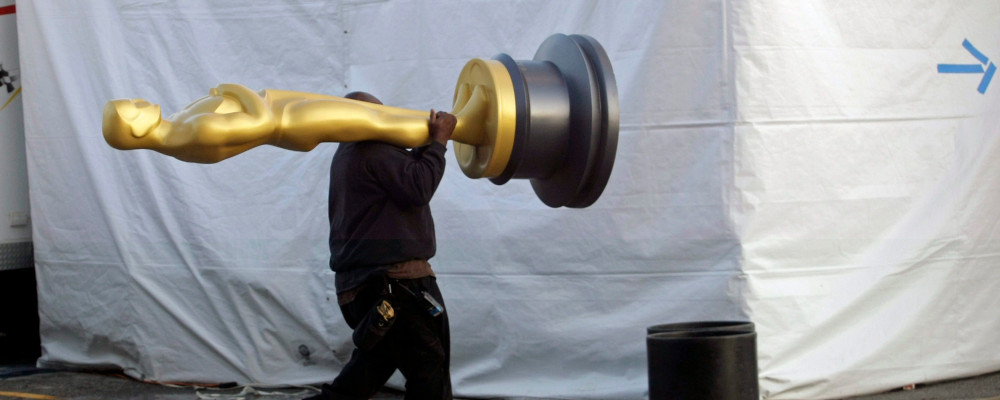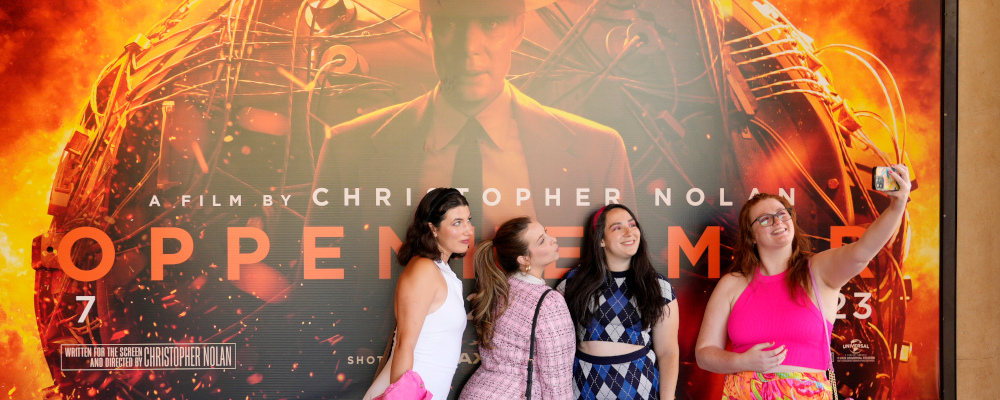Greetings from Los Angeles, where we’re closing out the most stacked awards season on record. The Oscars are on Sunday, but they’re not even the hottest ticket in town. That’s any available seat at a screening of Dune: Part Two in the greater Los Angeles area, ideally in IMAX.
In a city of film aficionados who can scarcely pronounce Villeneuve.
Oscar buzz for Dune: Part Two has already started, setting the stage for campaign 2025.
Forgive us weary Angelenos if the prospect of Oscars 2025 is overwhelming. We’ve just experienced first-hand the campaign for every film and television award at once, in an industry that loves giving out awards.
For those of us who grew up knowing how to pronounce Villeneuve and who love a good political campaign, it’s the equivalent of running Canadian federal, provincial, and municipal campaigns all at once.

The reconstituted (long story) Golden Globes were on January 7th. The Emmys (a well-produced nod to TV’s history and a farewell to Succession) a week later. In the last two weeks alone, we’ve seen the Screen Actors Guild Awards (a slightly drunken ode to solidarity and the craft of acting with sanctioned swears to keep it real) and the Independent Spirit Awards (exactly what it sounds like, and don’t you dare wear an evening gown to a tent on the beach), not to mention all the guild awards.
Let it not be said, though, that the people aren’t having fun. Indie superproducer Christine Vachon, finally nominated for a Best Picture Oscar in her capacity as an EP of Past Lives, has taken to social media to rate awards show experiences (and airport lounges!). The Producers Guild Awards was a fail for its lack of open bar and “woeful” table wine. But the parting breakfast burrito? Transcendent.
The timing, you may be aware, is because 2023 was the Year of the Strike. The writers and actors struck simultaneously, for anxiety-inducing months, with the now-Oscar-favourite cast of Oppenheimer famously walking from the red carpet of the film’s London premiere the minute SAG-AFTRA called the strike. Said cast wound up, according to the charming publicity threesome of Emily Blunt, Robert Downey Jr., and Cillian Murphy, at a bar until the wee hours instead.
Who among us wouldn’t want to drink with the, as we apparently now call them, Oppenhomies? Not to mention give them credit for their box-office-busting, auteur-made putative Best Picture. That, in a nutshell, is the Oscar campaign for Oppenheimer and the overall trend in Oscar campaigns—great, or at least good, art with a side of relatable talent.
In La La Land the campaigns come with the moniker For Your Consideration (FYC) or, if you’re Netflix and cheeky, FYSEE. It’s a marathon of screenings and receptions and activations and advertising and earned media, consumer, and trade.
FYC campaigns aren’t born in war rooms, but on studio lots and in the offices of multitudinous agencies or awards consultants (some are exiles from entertainment trade journalism). No matter where they’re born, all campaigns start with a narrative.
The implementing communications teams, like blank-faced staffers in the back of a scrum, hover in the background of red carpets in wraithlike “publicist black,” tending gently to their assigned talent. Monitoring interviews, gritting their teeth at poor choices of words, and holding up placards printed with the names of their charges so the wire photographers can catalog them properly.
Like an advance team decking out a bland Radisson ballroom with gleefully colour-coded partisan signage, the team producing the Oscars will take a theatre located in one of the most depressing parts of LA (a gritty complex at the intersection of Hollywood and Highland, avoided by locals at all costs), shut down the surrounding streets, and paint the town Oscar gold and red. (The red carpet is unfurled adjacent to ice cream stores, professional Superman impersonators, and a Ripley’s Believe It or Not.)
The metaphor for political campaigns works until you get to glamour. There’s no political corollary for observations of who’s wearing Nicolas Ghesquière (mostly Emma Stone, to great effect). Or who’s had a session with LA’s resident lymphatic massage expert, a charming young Brazilian woman whose handiwork ensures a smooth, glowing body and a flat stomach. Or for the fact that everyone involved has a persona, even the stylists.
But being a nominee is like being a political candidate—exhausting—and the core tenets of Oscar campaigns have a lot in common with the political. Stick to your brand. Know your messaging. Don’t peak too soon.
The winning campaigns will have these factors, along with the requisite luck and timing, but the best campaign doesn’t always win. Sometimes the Oscar voters, as a bloc, have their own ideas. This time out, consensus favours the favourites (if you will).

Best Picture
Best campaign: Oppenheimer
Will win: Oppenheimer
Oppenheimer checks all the boxes—the masterfully executed work of a respected auteur who is owed an Oscar, a billion-dollar hit on a serious and seriously controversial subject, supported in a charm offensive campaign led by a heavy-hitting celebrity cast.
Best Director
Best campaign: Christopher Nolan
Will win: Christopher Nolan
The Nolan campaign has been all about giving a master the laurels he deserves, and the Academy is here for it.
Best Actress
Best campaign: Lily Gladstone
Will win: Too close to call
There’s general agreement on the LA scene that we don’t know what will happen here. Lily Gladstone rightly has significant support for her outstanding performance in Killers of the Flower Moon, but that hasn’t stopped Emma Stone from picking up most of the major awards along the way with her showy role in Poor Things (save for the SAG Award).
Best Actor
Best campaign: Paul Giamatti
Will win: Cillian Murphy
In the year of Oppenheimer, this category is the titular Oppenheimer’s to lose. The only possible upset is Paul Giamatti of The Holdovers, whose chef’s kiss awards season moment was his relatable, and incredibly meme-able, visit to In-N-Out Burger after winning the Golden Globe. Honourable mention for Maestro’s Bradley Cooper, who’s discovering that sometimes your film just came out in the wrong year.
Best Supporting Actress
Best campaign: America Ferrera
Will win: Da’Vine Joy Randolph
America Ferrera’s campaign—from charming social media to discussion panels at screenings building on residual buzz over her Barbie monologue—has been outstanding from the beginning, leading her to secure the nomination. As present as Ferrera has been on the campaign circuit, Da’Vine Joy Randolph has handily won every lead-up award for her performance as a bereaved mother in The Holdovers.
Best Supporting Actor
Best campaign: Robert Downey Jr.
Will win: Robert Downey Jr.
Having spent awards season showing off his wicked sense of humour as part of the Oppenheimer cast routine, Robert Downey Jr. is about to get his flowers after decades as an actor’s actor, movie star, and beloved Hollywood community member whose success story works on a lot of levels. Seeing Ryan Gosling sing and dance as Ken at Sunday’s ceremony will have to be…Kenough.
As we conclude the awards season to end all awards seasons, the campaigns will reach their (hopefully narratively satisfying) conclusions. The temporary glamour outpost in the middle of Hollywood and Highland will be dismantled. Harried publicists, overworked stylists, and journalists who have been wearing the same blazer for months will breathe a sigh of relief. For now.
Get the French pronunciation guide ready. The Dune: Part Two campaign has already started. Let’s hope it’s not peaking too soon.
Recommended for You

Ginny Roth: How vacant liberal nationalism left Canada worse off than George Grant even imagined

Matthew Grills: Joey Chestnut is America

Michael Kaumeyer: Polite decline: Canada’s aversion to being our best is holding us back

Howard Anglin: Lament for a Lament



